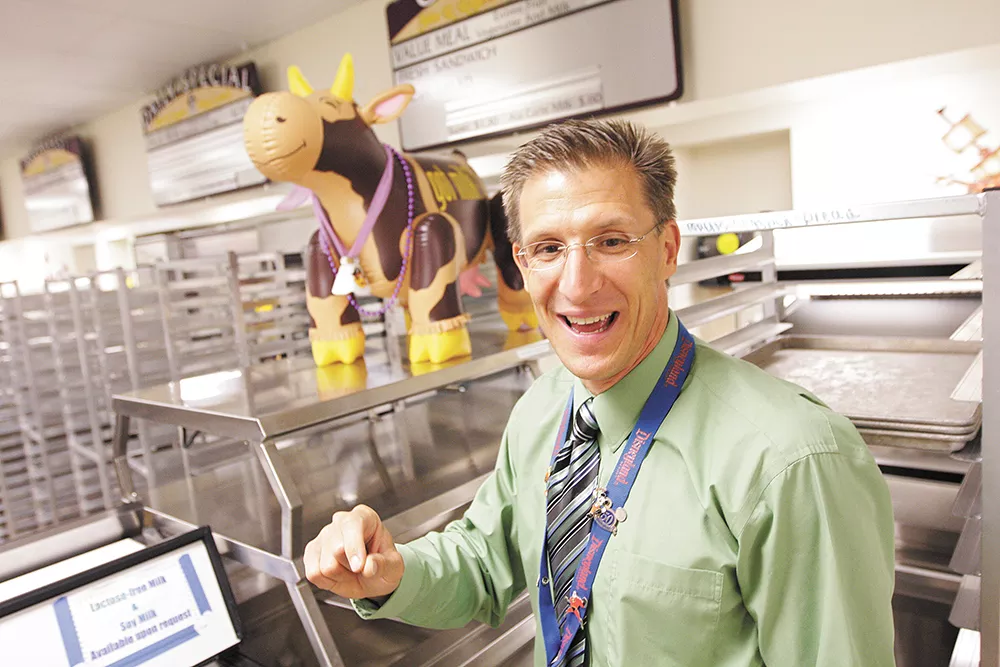Ready for school? As the summer winds down, colorful supplies and new clothes may dominate kids' thoughts as they prepare to embark on the school year. But students who really succeed have more than the right notebooks and pens. For better test scores, attendance and behavior in school this year, students mainly need just one thing: a parent or caregiver who's invested in their education, from the breakfast they eat in the morning to the level of support they get in their hardest subjects to the time they go to bed at night.
"Every parent wants their child to do well in school and socially," says Jenny Rose, president of the Spokane Education Association, who is on sabbatical as a third-grade teacher. "What's going on at home is just as important as what's going on at school."
The scenario transcends demographics: regardless of other factors in kids' lives, students with involved parents perform better in the classroom both academically and socially, according to a prominent review of research by the Southwest Educational Development Laboratory in 2002.
"Involvement" can take the form of volunteering at school; it can also mean creating a home environment that is conducive to learning. Parents or caregivers may not be at every meeting or fundraiser, but they can be involved in ways that fundamentally help kids succeed. To make it simple, some Spokane educators distill it all into two objectives: communication and routine.

Communication
Kids are in school about 30 hours each week. That's 120 hours each month that could be a blind spot if parents, teachers and students don't work together to communicate what's going on. It may seem simple or obvious, but having open communication with children and with educators is the most important step for a parent or caregiver who wants to help their kids succeed in school.
"My number one thing is communication with the teacher," Rose says. To her, it's a good sign when parents want to get to know the teacher and find a way to stay in contact throughout the year, "because we spend so much time with their children."
For working parents, getting regular facetime with the teacher can be hard to accomplish, but they can still make their presence known. Many teachers are open to corresponding over email or checking in over the phone. Some teachers send out information or keep a website with updates about lesson plans and tips about how to reinforce lessons at home. In Spokane schools, parents can check on their middle and high school kids' progress through the district's PowerSchool system, which records generally up-to-the minute grades and attendance, as well as standardized test scores from the student's whole career. Elementary school teachers may employ convenient apps like ClassDojo, with cute red, yellow or green graphics that offer parents a window into kids' behavior while at school.
Collaboration among all the adults in a child's life provides a better chance that any problems will be addressed early, says Gonzaga School of Education Dean Vincent Alfonso. Additionally, a strong parent-teacher relationship reinforces to the child that he or she is being cared for — a stress reliever that shouldn't be underestimated.
"When children learn that parent and teacher are working together, they feel safe and secure," Alfonso says.
But it isn't only the adults who should talk more. As students encounter difficult academics and new social situations, they'll need help navigating their expanding world. So parents need to know what's going on. The most basic way to know what's going on is to ask them, Alfonso says.
"Kids need to feel comfortable talking to their parents about school," he says. This line of communication can be opened through questions about what happened during the day, what they learned, who they interacted with, and how they're handling it all. Some of the best conversations can take place in the car, where kids may feel more comfortable talking since they aren't face-to-face with their parent. Questions are key. Kids may not spontaneously report something that's troubling them. Don't assume there's not a problem, Alfonso suggested. Establishing good communication early on teaches kids that they have an adult who will listen and care even as they grow up and their level of independence and way of communicating changes.
To feel comfortable opening up about school and life, Alfonso suggests that kids shouldn't be punished for being honest. That's not to say they shouldn't be accountable for their behavior, but using fear or punishment to achieve compliance is likely to backfire when the child (or teen) shuts down.
Communicating with kids goes two ways, he says. Alfonso suggests that parents should speak positively about school and be upfront with their kids about major decisions that will impact their lives. "Some families may decide to move or change schools. You can't just spring that on them last-minute. They need to take into account kids' thoughts on that. I think that's important," he says.

Routine Success
Let's start at the beginning: School-age children and teenagers need a lot of sleep. Until age 13, experts recommend nine to 11 hours of sleep each night to promote mental and physical development. Teenagers need eight to 11 hours.
As every adult likely knows, getting enough sleep isn't easy when you have too many demands or you're too wound up to fall asleep at a decent time. It's the same for kids, which is why developing a routine that isn't overfilled and sticking to it is critical for helping them do well in school.
An effective routine creates stability, and stability is key for learning, Rose says experience has taught her. "My understanding throughout the years is kids need structure. You can tell the students in your classroom who don't have structure. They don't have any kind of structure, so they're all over the place. I don't mean their behavior, I mean their learning," she says. "It doesn't have to a really rigid structure. There has to be some sort of structure."
Besides sleep, a healthy diet goes a long way in setting up a student for a successful school year. Good nutrition is key for helping kids focus in school, says Douglas Wordell, a registered dietitian and the Nutrition Services Director at Spokane Public Schools.
"We're not the cause and we're not the sole solution of the obesity epidemic and nutrient problem, but we're a place that can start making changes," Wordell says. "From a fundamental state, you have to be well-nourished ... to be able to think."
At Spokane Public Schools, improving nutrition includes educating parents. With more emphasis on whole foods and scratch cooking, schools are putting together recipes that also can be used at home. The meals made at school are put together on a budget, albeit for a much bigger "family," and are designed to be prepared quickly, so Wordell thinks they can translate smoothly to a home environment.
Despite the plethora of elaborate and competitive cooking shows on TV, meals can be simple: Parents should shoot for the kinds of foods that pack in nutrients that help development and keep kids' blood sugar relatively stable, so they don't have the crash that accompanies sugary drinks and snacks.
"Start off with a good breakfast," Wordell says. "Kids who skipped breakfast aren't going to be able to focus."
Having solid snacks available quickly is helpful, too, to boost a student's mood or energy between meals. Instead of candy or chips, try nuts or dried fruit for easy-to-tote backpack snacks. Aim to have them eat fruits and vegetables at every meal, Wordell adds. They have vitamins and minerals that promote growth. Sugary drinks, even ones that may seem somewhat healthy like Gatorade or other sports drinks, have the calories to quickly curb hunger pangs, but don't have nutrients of whole foods that help kids perform on a cellular level.
"They need to be getting those vegetables and fruits," Wordell stresses. "It's going to help them through their day and with their learning."
While it's true that food is fuel, it's also culture. Studies show that family time — which often happens naturally during a shared meal — is key to developing relationships that help with academic success. Meals together provide a natural opportunity to work on communication, too.
"It seems like a simple thing," Wordell says. "But it's significant." ♦
Does your kid's backpack look and smell like a gerbil cage, with homework and assigned readings wrinkled or shredded? Debbie Knutson, director of the Spokane tutoring service Education NW Resources, suggests that something as simple as an accordion file folder can improve a messy student's organizational habits. The folder's multiple pockets can compartmentalize documents for different classes or uses — separate spaces for handouts, in-progress assignments, homework to be submitted, and so on.
The key is to keep at it, day after day. Knutson says it's a great way to stay organized throughout the school day, so that when the bell rings and the teacher hands out an assignment with no three-hole-punch in sight, students already have a dedicated space for it.
If old-school methods aren't your kid's thing, smartphone or computer apps can provide helpful tools. One such product is Google Keep, a free program that allows students to create notes, lists and reminders. It can even transcribe text from a photograph uploaded to the app.
Knutson says that apps can help "in a way," but students must learn how to program them to send notifications and set up a schedule early in the process for it to be beneficial. You have to organize your apps, in other words.
"Students have a lot of pressure on them," says Knutson. It's important to developing good organization early in the school year, she says, to ingrain positive habits.
— CONNOR DINNISON
The day of the big test is here. Preparation is over. Pencils are sharpened. The test is in your young student's hands. Shaky, sweaty hands. And the mind goes blank.
For students with test anxiety, it's an all-too-familiar nightmare scenario, but one that can be managed with good old-fashioned courage, says Julie Walsh, owner and director of Think Smart Tutoring on the South Hill.
"Face those fears," she urges. "The mountain they thought they had to climb isn't so bad once they start."
Education NW Resources' Debbie Knutson concurs. "The better students know the material, the less anxiety they'll have," she says. She likens it to learning to play the piano. "You have to do it. You can't just listen to it.
"They have to actively study, not passively," she continues. That means doing sets of practice problems, self-quizzing in the week prior to the test, using notecards and color-coding words to improve memorization, even tape-recording answers to practice questions and playing them back repetitively.
"We all have to work our brains," Knutson says.
But what to do when friends are going hunting for Pokémon after dinner? How can a kid possibly focus on studying? There's no magic way to avoid work that needs to be done, tutors say, but kids can work smarter by prioritizing and eliminating procrastination.
"That's a huge one," Knutson says. Shut off the phone and the TV while working toward a small goal, with a small reward once it is achieved.
"I used to bribe myself with M&Ms," she says with a laugh. A quick walk to hunt for Squirtle might do the trick for kids this fall.
— CONNOR DINNISON
• To learn more about Spokane Public Schools' special ed services, visit spokaneschools.org/Page/1642, call 509-354-7947, or email childfind@spokaneschools.org
• Khan Academy offers free online learning in a wide range of subjects for students of all grades, including test prep for graduating seniors. Visit khanacademy.org
• For crisis intervention and mental health community resources, call First Call for Help at 509-838-4428
















